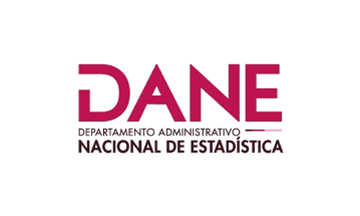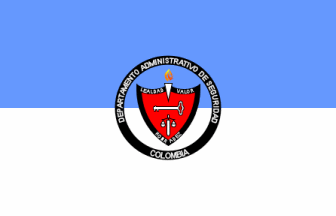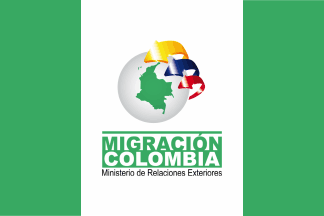
This page is part of © FOTW Flags Of The World website
Colombia - Governmental Organizations Flags
Administrative Departments
Last modified: 2026-01-02 by daniel rentería
Keywords: colombia | administrative departments |
Links: FOTW homepage |
search |
disclaimer and copyright |
write us |
mirrors
See also:
The full list of the current six Departamentos Administrativos
(Administrative Departments) is as follows, in order of precedence:
- DAPRE (Departamento Administrativo de la Presidencia de la República)
(established by Law 3 of August 24, 1898
) originally denominated as the General Secretariat of the Presidency of the
Republic, adopting its current denomination through
Law 61 of September 30, 1910.
(Administrative Department of the Presidency of the Republic; Source: funcionpublica.gov.co, official website at  <www.presidencia.gov.co>)
<www.presidencia.gov.co>)
- DNP (Departamento Nacional de Planeación) which has its origins in the establishment of the Administrative Department
of Planning and Technical Services via Law 19 of November 18, 1958 and [2].
(National Planning Department, official website  <www.dnp.gov.co>).
<www.dnp.gov.co>).
- DAFP - Departamento Administrativo de la Función Pública
(Public Service Administrative Department, official website at
 <www.dafp.gov.co>)
<www.dafp.gov.co>)
- DAFP - Departamento Administrativo para la Prosperidad Social
(Administrative Department for Social Prosperity)
- DNI - Dirección Nacional de Inteligencia
(Administrative Department for Social Prosperity)
- DANE - Departamento Administrativo Nacional de Estadística
(National Statistics Administrative Department, official website
at  <www.dane.gov.co>)
<www.dane.gov.co>)
There are additional Administrative Departments but not of national scope of operations,
labeled as such due to their size and focus, which serve exclusively
the city of Bogotá
due to its status as a District and they are:
- "Departamento Administrativo de la Defensor"a del Espacio Público,
Dadep" (Administrative Department of Defense of Public Space; official website: https://dadep.gov.co/; established in
1965)
- "Departamento Administrativo del Servicio Civil Distrital, DASCD)"
(Administrative Department of the District Civil Service)
(official website: serviciocivil.gov.co; established in
1974)
Source: alcaldiabogota.gov.co
The Social Prosperity and National Intelligence departments have taken the places of the following, today not having the same status:
- Agencia Presidencial para la Acción Social y la Cooperación International
(Presidential Agency for Social Action and International Cooperation)
- DANSOCIAL - Departamento Administrativo de Economía Solidaria
(Solidarian Economy Administrative Department, official website
at  <www.dansocial.gov.co>)
<www.dansocial.gov.co>)
- DAS - Departamento Administrativo de Seguridad
(Security Administrative Department)
Being totally supressed, in chronological order, are:
- Departamento Administrativo de Higiene y Salud Pública (
Administrative Department of Hygiene and Public Health; established
by Law 1 of January 5, 1931).
- Departamento Administrativo de Comunicaciones eléctricas y postales (Administrative Department of Electrical and Postal Communications)
- Departamento Administrativo de Asuntos seccionales y municipales (Administrative Department of Sectional and Municipal Affairs)
- Departamento Administrativo de Agricultura y ganadería (Administrative Department of Agriculture and Livestock)
- Departamento Administrativo de Seguridad (Administrative Department of Security)
Sources:  Colombian
Presidency official web site,
Colombian
Presidency official web site,  Ministry
of Interior and Justice official web site, funcionpublica.gov.co and
repositorio.unal.edu.co.
Ministry
of Interior and Justice official web site, funcionpublica.gov.co and
repositorio.unal.edu.co.
E. R., 3 August 2008 and 5 May 2025
There is one more Administrative Department:
- DPS (Departamento para la Prosperidad Social, Social Prosperity Department)
( official website) (formerly "Acción Social" (Agencia
Presidencial para la Acción Social y la Cooperación International).
official website) (formerly "Acción Social" (Agencia
Presidencial para la Acción Social y la Cooperación International).
This new Administrative Department encompasses the following institutions:
- ICBF;
- ANSPE (Agencia Nacional para la Superación de la Pobreza Extrema -
National Agency for the Overcome of Extreme Poverty) ( official
website);
official
website);
- Centro de Memoria Histórica (Historical Memory Center) ( official
website);
official
website);
- Unidad (Especial Administrativa) para la Consolidación Territorial
(Special Administrative Unit for Territorial Consolidation) ( official
website) (similar status to
UAEAC);
official
website) (similar status to
UAEAC);
- Unidad (Especial Administrativa) para la Atención y Reparación
Integral a las Víctimas (Special Administrative Unit for Attention and
Full Reparation of Victims) ( official website) (similar status to
UAEAC);
official website) (similar status to
UAEAC);
Sources:
 http://www.dps.gov.co/contenido/contenido.aspx?catID=3&conID=544&pagID=820
http://www.dps.gov.co/contenido/contenido.aspx?catID=3&conID=544&pagID=820
 http://www.icbf.gov.co/portal/pls/portal/docs/1/274095.PNG
http://www.icbf.gov.co/portal/pls/portal/docs/1/274095.PNG
Esteban Rivera, 04 April 2015
The "Departamentos Administrativos" or Administrative
Departments were first established
by the National Constitution of 1886 in Article 132.
They were later amended through Constitutional Reform enacted via
the
Legislative Act 1 of June 18, 1945. It
modified the 1886 Constitution in its Article
120 adding the category of (national) government entities and de
jure becoming part of the Executive Power together with the President
and its Cabinet of Ministers.
There's a new Bill recently approved by Congress that creates another
Administrative Department. The Agencia Presidencial para la Acción
Social y la Cooperación International (commonly known as "Acción
Social") (Presidential Agency for Social Action and International
Cooperation) will be established as an Administrative Department and will be in charge
of taking care of the victims of the Colombian Armed conflict from
1985 onwards. Victims from previous years (1984 and backwards will
only be compensated simbolically).
Source:
 http://www.cmi.com.co/?nt=61683
http://www.cmi.com.co/?nt=61683
Acción Social was established through Decree No. 2467 of July 2005.
Source:
 http://www.accionsocial.gov.co/contenido/contenido.aspx?catID=3&conID=544&pagID=821
http://www.accionsocial.gov.co/contenido/contenido.aspx?catID=3&conID=544&pagID=821
In this new reorganization, Acción Social will be merged with the CNRR
(Comisión Nacional de Reparación y Reconciliación) (National
Reparation and Reconciliation Commission), in order to provide victims
of the armed conflict with integral social and economic support. The
CNRR emerged from Law Ley 975 of 2005 dubbed "Justicia y Paz" (Justice
and Peace). The CNRR was established through Decree No. 4760 of 2005.
Source:  http://www.cnrr.org.co/contenido/09e/spip.php?article2629
http://www.cnrr.org.co/contenido/09e/spip.php?article2629
Esteban Rivera, 13 April 2011


images located by Esteban Rivera, 1 August 2023
The "Centro Nacional de Memoria Histórica" (English: National Center
for Historical Memory) is a government agency attached to the
Administrative Department for Social Prosperity. It is in
charge of preserving the memory of the internal armed conflict in
Colombia.
It was created by the "Ley de Víctimas y Restitución de Tierras"
(English: Victims and Land Restitution Law) 1448 of 2011
(http://www.secretariasenado.gov.co/senado/basedoc/ley_1448_2011.html)
(although there were previous written reports as early as 2008) and is
in charge of contributing to the duty of memory of the State on the
occasion of the violations that occurred in the framework of the
Colombian armed conflict. It also helps in comprehensive reparation
and the right to the truth of which the victims and all of society as
a whole are holders.
Source: https://centrodememoriahistorica.gov.co/contexto/
The flag is a white horizontal background with the logo in the middle.
Logo
.gif)
image located by Esteban Rivera, 1 August 2023
Inscribed Version

.gif)
flag photo from Twitter, logo from Facebook
No Full Inscription

2.gif)
flag photo from LinkedIn, logo from geoportal.dane.gov.co
(1970–2023) version

70.gif)
flag photo from sitios.dane.gov.co, logo from YouTube at 0:17
The "Departamento Administrativo Nacional de Estadística, DANE"
or National Administrative Department of Statistics is a
government organization in charge of planning, collection, processing,
analysis and dissemination of official statistics of the country.
It traces its origins to the National Statistics Office established in 1923 within the
General Comptroller of the Republic, to be renamed
"Dirección Nacional de Estadística" (National Statistics
Directorate) by Decree 2240 of October 25, 1951
to later adopt its current denomination and status by Decree 2666 of October 14, 1953.
Sources: [1],
, [2],
, [3],
[4], [5], and
[6].
The flag is a white horizontal background with the logo in the middle,
the logo being a punch card used to register data.
Esteban Rivera, 20 April 2025

.gif)
flag photo from elafrobogotano.com/co;
logo from antiguo.igac.gov.co
note: there are blue tassels on the flag
Variant 1 (Seal format)

from Twitter
Variant 2 (Text above and under)

from miputumayo.com.co
The IGAC traces its historical background dates as far back as the
work of the "Comisión Corográfica" (Chorographic Commission)
in 1850. Later it was followed by the establishment of the Office of Longitudes and Borders in
1902 (operational only since 1910) dependant on the Ministry of
Foreign Affairs.
The current organization was first established as "Instituto
Geográfico Militar" (Military Geographic Institute) through
Decree 1440 of August 13, 1945)
formally the "Departamento de Levantamiento del Estado Mayor General
del Ejército" (Department of Survey of the General Staff of
the Army). In
1940 it is transferred to the
Ministry of Finance and Public Credit. In 1950 it
adopts its current denomination in honor of the 100th anniversary of
the Chorographic Commission and in 1957 it is formally designated the
Instituto Geográfico Agustín Codazzi (Agustín Codazzi
Geographical Institute) through)
Decree 290 of November 8, 1957 and
established as a decentralized government organization. Later through
Decree 1174 of June 29, 1999 it is transferred to the DANE.
Its main functions are:
Produce the official map and basic cartography of Colombia.
Prepare the national real estate cadastre.
Conduct an inventory of soil characteristics.
Conduct geographic research to support territorial development.
Train and educate professionals in geographic information technologies.
Coordinate the Colombian Spatial Data Infrastructure (ICDE).
Sources: igac.gov.co
antiguo.igac.gov.co,
antiguo.igac.gov.co,
igac.gov.co, YouTube
and wikipedia.org
The logo was established in the 1990's, its flag being white with the logo placed upon it.
Source: Corporate Identity Manual
Esteban Rivera, 29 May 2025
The Agustín Codazzi Geographic Institute is the entity responsible for producing the official map and basic cartography of
Colombia (it is the national cartographic agency of Colombia), preparing the national cadastre of real estate, carrying out the
inventory of soil characteristics, carrying out geographic research to support territorial development, training and educating professionals in geographic information technologies and coordinating the Colombian Spatial Data infrastructure.
Its main office is in Bogotá.
Sources: [1],
[2],
[3],
[4], and
[5].
The current logo was established in 2008 and its explanation is as
follows (original in Spanish):
"The circle and the triangle: Shows the Institute's generalized
function. The symbol of the planet as a base and the triangle
illustrating the photographic vision encompass its function."
"The outer rectangle and the geometric silhouette of Colombia: Shows
the territory where the Institute operates. A simplified form of
Colombia allows for visualization of the territory. It shows solidity,
firmness, and agility. By framing the composition that integrates each
of the elements, it solidifies the elements to be displayed."
The colors are:
Blue: Pantone 2954C ; C:100 M:50 Y:0 K:0 ; R:0 G:106 B: 179
Yellow: Pantone 130C ; C:0 M:30 Y:100 K:0 ; R:250 G:187 B:0
Green: Pantone 348C ; C:75 M:0 Y:75 K:0 ; R:56 G:169 B:98
The font type is Swiss 721 BT and Gill Sans MT.
Source: Identity Manual
The flag is a white horizontal background with the logo in the middle
with the name below in black capitals
Esteban Rivera, 10 October 2025
1995–2008 Logo
.jpg)
from antiguo.igac.gov.co
1990 Logo
.jpg)
from antiguo.igac.gov.co
Commemorative Editions (1982 & 1985; respectively)
.jpg)
.jpg)
from antiguo.igac.gov.co
1974 Logo
.jpg)
from antiguo.igac.gov.co
1970 Logo
.jpg)
from antiguo.igac.gov.co
1940 Logo
.jpg)
.jpg)
both from antiguo.igac.gov.co
1936 Logo
.jpg)
from antiguo.igac.gov.co

image by Eugene Ipavec, 9 November 2005

image by Eugene Ipavec, 9 November 2005

reverse
image by Eugene Ipavec, 2 March 2006
.jpg)
Coat of Arms
image contributed by E. R., 12 June 2005
Translated from  <www.das.gov.co>
(located by Dov Gutterman): "On rectangular shape,
is formed by sky blue and white colors in two equal horizontal
bands, with sky blue on top and white on bottom, the national
tricolor will appear in circular 'cucarda' shape in the center of
the flag."
<www.das.gov.co>
(located by Dov Gutterman): "On rectangular shape,
is formed by sky blue and white colors in two equal horizontal
bands, with sky blue on top and white on bottom, the national
tricolor will appear in circular 'cucarda' shape in the center of
the flag."
Departamento Administrativo de Seguridad (Administrative Security
Department), is Colombia's secret police, in charge of home land
security, immigration, emigration, bodyguards for public
servants, criminal investigations, etc.
Carlos Thompson, 5 November 2004
Coat of Arms of DAS (Security, Intelligence and Secret
Service) is taken from the book "Himnos y Símbolos de
Nuestra Colombia" , page 278. Written in 2000 by Julio Cesar
García, edited by Camer Editores. ISBN 958-33-1489-7.
E. R., 12 June 2005
There is an additional flag which has the same color pattern,
only with the DAS Coat of Arms in the middle.
E. R., 9 November 2005

image by Zoltan Horvath, 18 March 2015
On March 11 on the online version of local newspaper "El Mundo" (The World),
I found this
 article regarding the new appointmen of former Dirección Nacional de
Migración (National Director of Migration,a ctually a wrong comment by the
newspaper, since the official name of his post is Director General de Migración,
Migration Director General) to a new post, I came across a new government agency
flag. In the article, one can see a
article regarding the new appointmen of former Dirección Nacional de
Migración (National Director of Migration,a ctually a wrong comment by the
newspaper, since the official name of his post is Director General de Migración,
Migration Director General) to a new post, I came across a new government agency
flag. In the article, one can see a
 picture showing the flag of the UAE (Unidad Administrativa Especial) -
Migración Colombia (Special Administrative Unit - Migration Colombia), like
Aerocivil for instance. When looking through other sources (including official
websites) I found that the picture on the newspaper is actually an
official photo (as seen
picture showing the flag of the UAE (Unidad Administrativa Especial) -
Migración Colombia (Special Administrative Unit - Migration Colombia), like
Aerocivil for instance. When looking through other sources (including official
websites) I found that the picture on the newspaper is actually an
official photo (as seen
 here:
here:
Source:
 http://www.migracioncolombia.gov.co/index.php/prensa/comunicados/comunicados-2014/diciembre-2013/1749-christian-krueger-es-el-nuevo-encargado-de-la-direccion-general-de-migracion-colombia
http://www.migracioncolombia.gov.co/index.php/prensa/comunicados/comunicados-2014/diciembre-2013/1749-christian-krueger-es-el-nuevo-encargado-de-la-direccion-general-de-migracion-colombia
The flag is a green/white/green horizontal flag, with the
 logo in the middle.
logo in the middle.
Migration duties (immigration and emmigration) where once carried out
by DAS but since
January 1, 2012 they are carried out by this new gonvernment agency.
Sources:
 http://www.cancilleria.gov.co/content/ya-est%C3%A1-en-operaci%C3%B3n-la-unidad-administrativa-especial-de-migraci%C3%B3n-colombia
http://www.cancilleria.gov.co/content/ya-est%C3%A1-en-operaci%C3%B3n-la-unidad-administrativa-especial-de-migraci%C3%B3n-colombia
 http://www.cancilleria.gov.co/colombia/migration
http://www.cancilleria.gov.co/colombia/migration
For additional information go to:  Migración Colombia (official website)
Migración Colombia (official website)
 http://www.migracioncolombia.gov.co/
http://www.migracioncolombia.gov.co/
Esteban Rivera, 16 March 2015

image by Zoltan Horvath, 22 March 2015
The UNP (Unidad Nacional de Protección, Protection National Unit) is an
entity created to supress the
DAS (regarding the
tasks
of protecting VIP personalities). It was created by Decree No. 4065 of
2011 and regulated by the Decree No. 4912 of 2011. It is in charge of
articulating, coordinating and executing the protection service to
VIP's according to the Government's designation.
The flag is a grey horizontal flag with the logo in the middle, as
seen in this
 picture
(the UNP flag is on the right, and the logo is on the middle). The
picture
(the UNP flag is on the right, and the logo is on the middle). The
 logo resembles a police badge with a stylized (an Andean) Condor (Vultur
gryphus) on top. On top it reads in latin capital letters "PER VITAM
HOMINUM TUENDAM"
logo resembles a police badge with a stylized (an Andean) Condor (Vultur
gryphus) on top. On top it reads in latin capital letters "PER VITAM
HOMINUM TUENDAM"
Source:  http://www.unp.gov.co/organigrama.html
http://www.unp.gov.co/organigrama.html
Another image can be seen
 here
here
Source:
 http://www.eluniversal.com.co/politica/ministro-del-interior-reafirmo-proteccion-candidatos-presidenciales-154369
http://www.eluniversal.com.co/politica/ministro-del-interior-reafirmo-proteccion-candidatos-presidenciales-154369
For additional information go to:  UNP (official website)
UNP (official website)
Esteban Rivera, 22 March 2015
I think the UNP flag is not only simple grey, but it is divided diagonally
into grey and blue triangles, and logo is placed in the middle of the flag as
seen
 here and
here and  here.
here.
Zoltan Horvath, 22 March 2015
 <www.presidencia.gov.co>)
<www.presidencia.gov.co>) <www.dnp.gov.co>).
<www.dnp.gov.co>). <www.dafp.gov.co>)
<www.dafp.gov.co>) <www.dane.gov.co>)
<www.dane.gov.co>) <www.dansocial.gov.co>)
<www.dansocial.gov.co>) Colombian
Presidency official web site,
Colombian
Presidency official web site,  Ministry
of Interior and Justice official web site, funcionpublica.gov.co and
repositorio.unal.edu.co.
Ministry
of Interior and Justice official web site, funcionpublica.gov.co and
repositorio.unal.edu.co.



.gif)

.gif)

2.gif)

70.gif)

.gif)


.jpg)
.jpg)
.jpg)
.jpg)
.jpg)
.jpg)
.jpg)
.jpg)
.jpg)



.jpg)

